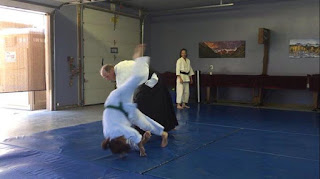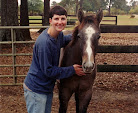 |
| Many thanks to the lovely Vicky Devlin for demonstrating. |
Mark teaches aikido alongside horsemanship because so many key elements of horse work are present in this martial art form: internal softness, blending, finding openings, directing energy, feeling what your partner is doing inside, and many more. Aikido translates as "the way of harmony" and that is exactly what we are trying to find with our horses: a way to work with them rather than against them. (Mark has recently coined the term aibado, which means "the way of harmony with horses," to explain what we study in the dojo.)
But there are more mechanical reasons to pair horsemanship and aikido as well, and one of the most empowering skills we can learn is how to fall.
If you ride horses for a decent chunk of your life, you are going to fall off. My grandmother used to say you're not a real horsewoman until you've fallen off at least three times. (Being an overachiever I've fallen a substantially larger number of times than that.)
Sometimes falling is no big deal, but as we get older it's easy to feel less comfortable about the idea, particularly as we hear stories of injuries or become seriously injured ourselves. And fear, once it has a small foothold, tends to keep growing whether we're conscious of it or not.
The fear of falling is, Mark explained, the reason that most of us are so intent on controlling everything when we're in the saddle. Fear can lead us to micromanage our horses and be overly quick to shut them down. It leaves us in a slightly wary, slightly tense state that makes true connection with our horses almost impossible because we don't trust them enough to let go.
What we need to trust, however, is not so much our horses as ourselves. If we don't believe in our ability to take care of ourselves, we will never be 100% relaxed no matter how steady the horse that we are riding.
And part of our ability to take care of ourselves is knowing that we still have choices even when the wheels come off, as Mark would say. Even when we're flying toward the ground at a rapid speed, we still have choices about how we will land. Even when someone comes at us with a weapon, we still have choices about how we respond. The key in both of these situations is knowing that, no matter what happens, we are never simply victims of external circumstances with no say at all in what happens from here.
Mark said that once we recognize that we have control over how we fall, we don't feel such a strong need to control every other piece. We know that we can be okay even if the worst happens, so we can allow things to be a little less certain and ourselves to be a little less in control.
As Mark was explaining all of this, I couldn't help but think how we do the exact same thing in the rest of our lives that we do in the saddle. We fear that, when the worst comes to pass, we will be completely powerless. We believe that we have no control over the really critical stuff like a serious injury, or a partner leaving, or losing a job. So we try to control everything else in an attempt to prevent these situations rather than learning skills that might help us cope with them better.
Knowing that we can choose to be soft and responsive in any situation instead of bracing and defending ourselves has been one of the most important lessons I've learned in the dojo. We can always choose to move into and blend with whatever is coming toward us--choose connection and relaxation over resistance and reactiveness. In the things that really matter we have the kind of control that really matters: we have control over how we respond. Will we roll with what comes our way? I love that aikido teaches this skill in its most literal sense.




No comments:
Post a Comment